ASX a little higher; Crown ‘terminates’ James Packer private company link
Crown ‘terminates’ link with Packer’s private company, while the ASX 200 closed only slightly higher on Wednesday.
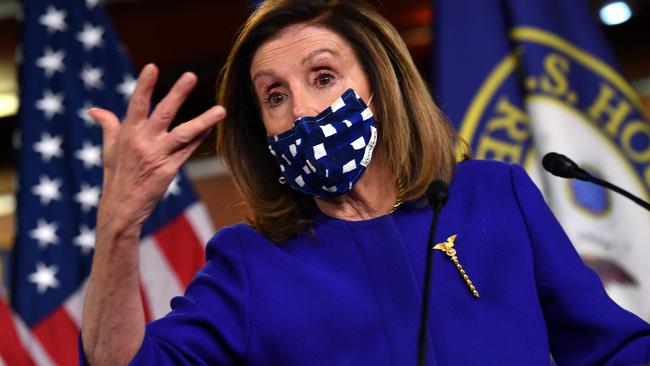
That’s all from the Trading Day blog for Wednesday, October 21. Australian stocks closed slightly higher after the S&P 500 rose 0.5pc overnight and as futures are up 0.7pc on Wednesday amid progress on US stimulus talks. Locally, preliminary retail sales fell 1.5pc on month in September and Crown ‘terminates’ link with Packer’s private company.
8.10pm: Crown ‘terminates’ link with Packer’s private company
Crown Resorts late on Wednesday said it was terminating a so-called services agreement and controlling shareholder protocol with the private company controlled by billionaire James Packer which among other things allowed the sharing of confidential information between Crown and Mr Packer.
The controversial agreement came under focus during the NSW casino inquiry with Mr Packer getting access to price sensitive information although he has stepped down from the board.
“Crown Resorts Limited announced today the termination of the following agreements between Crown and Consolidated Press Holdings Pty Limited,” Crown said in a statement.
“The Services Agreement dated 1 July 2016 which enabled Crown to request the provision of services by key CPH executives at pre-agreed hourly rates; and the Controlling Shareholder Protocol dated 31 October 2018 which enabled the sharing of confidential information by Crown to CPH and James Packer”.
Crown chairman Helen Coonan in her evidence during this week revealed she had suspended both the agreement and the protocol, subject to final approval from the board.
Adeshola Ore 8.08pm: Stores ‘still have a role’ for Kathmandu
Kathmandu chief executive Reuben Casey says bricks-and-mortar stores still play a fundamental role in the company despite COVID-19 accelerating consumers’ uptake of online shopping.
Mr Casey said the New Zealand outdoor retailer was guided by its customers in determining the balance between physical stores and its online platform.
“We really believe that online and bricks-and-mortar stores really operate in conjunction with one another,” Mr Casey told The Australian’s E-Commerce Summit on Wednesday.
“Where we see online is strong in a particular customer catchment, often the store is doing well in that catchment and vice versa. It’s about both our stores and online experiences supporting each other and driving the experience of our Kathmandu brand.”
Mr Casey said customers were most likely to visit a store in person if they were buying technical products such as hiking boots or a multi-day hike backpack.
The retailer’s percentage of online sales rose from 10.5 per cent to 18.5 per cent in the past financial year.
Jared Lynch 7.41pm: End of free shipping era?
Inbound international parcel volumes have more than doubled during COVID-19, with global logistics giant FedEx tapping into its network of 670 air-freighters to minimise delays that have plagued other delivery services throughout the pandemic.
But swift delivery comes at a cost, which has long been a friction point in e-commerce — with online giant Amazon spending billions each year on free shipping to keep shoppers sticky.
As the pandemic fuels lengthy delays — not just for parcels sent from overseas but even items sent between Australian cities and regions — Peter Langley, vice-president for FedEx Express Australasia, says the mindset among customers is shifting.
James Glynn 7.09pm: Edwards urges RBA to buy bonds
Former Reserve Bank board member John Edwards has urged the central bank to ramp up government bond buying, saying it’s the best option for supporting the economy as it shrugs off the worst of the COVID-19 recession and turns for growth.
“The most effective way for the RBA to assist the economy at this point is to buy more Australian government bonds at the long end, for example 10 years,” Dr Edwards said.
The comments by Dr Edwards, who served on the RBA board as the economy emerged from the global financial crisis, come as the central bank hints strongly at the announcement of a bigger bond buying program at its November 3 policy meeting.
Dow Jones newswires
David Ross 6.34pm: Bendigo broke cash rules: APRA
The prudential regulator has hit Bendigo and Adelaide Bank for breaching rules around holding minimum levels of cash on its balance sheet, ordering the bank to add a 10 per cent penalty to its minimum liquidity requirements from 2 November.
The penalty comes after Bendigo and Adelaide Bank incorrectly categorised certain deposits for the purposes of calculating the liquidity coverage ratio (LCR) at the bank.
The bank notified the Australian Prudential Regulatory Authority in September of the multiple breaches of the liquidity standards stemming from IT coding that incorrectly classified some retail deposits in the most stable category of the LCR and net stable funding ratio. The breaches stem back to January 2015.
APRA noted that the breaches, while material, “do not impact the overall soundness of Bendigo and Adelaide Bank’s current liquidity position.
“However, they raise questions over the bank’s past risk management practices, and ability to accurately calculate and report its liquidity ratios,” APRA said.
Bendigo and Adelaide Bank in a statement to the market noted their current LCR was 160.9 per cent over the past 14 days, well above APRA’s minimum requirement of 100 per cent.
As of 19 October the bank’s LCR was at 167.7 per cent, or 152.4 per cent including the overlay.
“The bank recognises the significance of this matter and is actively working with APRA,” Bendigo Bank said.
Bridget Carter 5.03pm: Westpac selldown of Zip Co through UBS
Westpac is taking profits from its investment in by-now-pay later provider Zip Co, selling its entire holding after the market closed on Wednesday.
The Australian bank has held about 10 per cent of shares in Zip Co, which has seen its share price more than double this year amid the COVID-19 pandemic.
Working on the $366m sell down was UBS, offloading 55 million shares at $6.65 each.
Shares in Zip closed 1c higher to $7.08.
Zip has a $3.663bn market value.
The sell down comes after Zip’s rival Afterpay announced on Tuesday that it had teamed up with Westpac to launch the by now pay later provider’s first savings account in Australia, which it said would be a banking product for budget focused consumers.
Afterpay said the new product enabled through Westpac would allow its customers to have greater control over their finances and be able to manage funds through one service, with the product expected to be available from July 2021.
The Australian listed Afterpay has 10 million customers globally.
4.23pm: ASX edges higher
Australia’s share market was flat in mixed trading despite a 0.5pc rise in the S&P 500 and 0.7pc gain in S&P 500 futures amid hopes of pre-election fiscal stimulus in the US.
After being confined to a narrow range of 6181.2-6206.3, the S&P/ASX 200 index finished up 0.1pc at 6191.8, with the focus mainly on AGM trading updates.
Gains in Energy, Financials, Materials, Real Estate and Industrials stocks offset falls in Utilities, Health Care, Consumer Staples, IT, Consumer Discretionary and Communications stocks.
Among large caps, CSL fell 1.3pc, Wesfarmers lost 1.5pc, Woolworths fell 1.3pc. Goodman fell 1.5pc and Coles lost 1.5pc, but NAB rose 1.6pc, CBA gained 0.8pc, ANZ rose 1.5pc, Westpac rose 1pc, BHP added 0.6pc and Macquarie rose 1.6pc.
Orora jumped 8pc on a strong 1Q trading update, but Megaport dived 14pc after its update
Joyce Moullakis 3.32pm: Court approves $1.3bn Westpac penalty
Westpac exposed the Australian community and financial system to serious risks from criminal behaviour, and the bank’s “serious and systemic” compliance failures warranted a $1.3bn penalty, the Federal Court has found.
In a judgement on Wednesday, Federal Court Judge Jonathan Beach approved the $1.3bn agreed penalty between Westpac and financial crimes regulator Austrac.
But he called on the nation’s banks to lift their game and said Westpac’s failure to meet its obligations required an “effective deterrent” against future flouting of the law.
“In my view it is an appropriate penalty.” he said.
“First, the Australian banking industry processes many billions of transactions each year and financial institutions are an important line of defence in protecting the community and the financial system from the risks associated with money laundering and terrorism financing... non compliance with the Act exposes the financial system and the community to very serious money laundering and terrorism financing risks. “
Justice Beach labelled the more than 23 million contraventions of the law by Westpac “serious and systemic”, and highlighted they occurred over a period of six years. He also lambasted Westpac’s risk management systems.
“Clearly, this system failed to properly identify, mitigate and manage the money laundering and terrorism financing risks,” Justice Beach said. “Further Westpac’s transaction monitoring program was seriously deficient, that had ramifications for monitoring international payment flows concerning billions of dollars that higher money laundering risks including risks associated with child exploitation and tax offences.”
The Federal Court needed to approve the $1.3bn penalty that Westpac and Austrac agreed to as part of a statement of agreed facts the parties made last month.
3.21pm: Hipages prepares to IPO
Online trade services platform hipages has lodged its prospectus with ASIC to list on the ASX by an initial public offering.
The company said in a statement today that the offer to retail and institutional investors is expected to raise total gross proceeds of $100.4m based on a price of $2.45 a share, valuing hipages at $286.8m.
“Today is an important milestone in our history of growth and innovation. With an average of one job posted every 23 seconds on our platform, hipages has become a leading player in the on-demand tradie economy,” chairman Chris Knoblanche said.
“An ASX listing will position the company for further success by expanding our ownership base, building our brand and providing access to capital markets.
“I am delighted to welcome new shareholders to join us for the next stage of our journey.”
Hipages is an online platform that connects tradies with new and existing clients.
Lachlan Moffet Gray 3.11pm: Dixon defends 60 Minutes rebuttal ads
Mr Aspinall displayed an email sent by the AFP in January of 2016 to Crown, where the AFP expressed concerns that criminals may be using accounts linked to Southbank and Riverbank for money-laundering processes.
“It wasn’t drawn to my attention,” Mr Dixon said.
Moving on, Mr Aspinall asked Mr Dixon if he was in favour of publishing a “strongly-worded” advertised response to the allegations raised by a 60 Minutes program last year that contained many inaccuracies.
“Yes,” Mr Dixon replied.
“As an ex-journalist, I felt there was no balance in it (the program) at all.”
Raising the issue of the CPH-Crown service agreement, which allowed executives of the Packer holding company to receive information about Crown and provide services for it, Mr Dixon displayed a 2018 email from lawyers to Mr Dixon that discusses modifying the agreement to remove reference to Mr Packer.
“Was it a conscious decision to try and obscure the fact that Mr Packer was getting this information?” Mr Aspinall asked.
“I don’t know if it’s a big trouble,” Mr Dixon said, who explained that most shareholders would agree with the information.
“I think any shareholder in Crown, when you’ve got a 30 to 40 per cent or more shareholder there, would feel that that shareholder would have an impact on the running of the company, and that their views would be absolutely beneficial,” he said.
“I think they would assume they were getting that.”
Scott Aspinall then played a recording of an activist investor asking Crown’s independent directors at a Crown AGM last year whether James Packer was receiving information ahead of other shareholders.
Then CFO Ken Barton replied by explaining Mr Packer can get information through the services agreement with Mr Packer’s company CPH, but neglected to mention the controlling shareholding protocol that separately allowed Mr Packer to request information.
Mr Aspinall asked Mr Dixon why he, as an independent director present at the meeting, did not give a full answer including the shareholder protocol.
“I didn’t think it was that bad of an answer at the end of the day, he didn’t quite specify straight out that there was a protocol, but that was no secret,” Mr Dixon said.
Commissioner Bergin interjected to say that had Mr Dixon known that Mr Packer was going to sell shares in Crown to Melco, he would have wanted the protocol suspended.
“One of the reasons you would want it suspended...is that you would want to protect Crown from the reputation of giving away confidential information to a person who is trading in its shares,” she said.
Mr Dixon agreed.
Mr Aspinall then mentioned The Australian’s Damon Kitney’s book on Crown and James Packer, Price of Fortune.
Within the book, Mr Dixon is recorded is saying that although looking after minority shareholders is important, it is important to remember that Mr Packer has a 47 per cent holding in the company, which “came out of the Packer family.”
“I think i’ve said that there quite strongly that visionaries, people who start these places, people who stay with the places, drive them for a long, long time, should never be subject to not being listened to properly and know what’s going on,” Mr Dixon explained.
“I think it’s an overall benefit to all the shareholders.
“My only disappointment in most of this is that they didn’t tell us they were going to sell to Melco.”
Scott Aspinall said he had no further questions.
Lachlan Moffet Gray 2.41pm: Dixon quizzed on Crown board appointments
The inquiry has resumed with Counsel assisting Scott Aspinall returning to the topic of director appointments.
He is showing Mr Dixon an email discussing the appointment of Antonia Korsanos as a director last year, wherein Packer executive John Alexander expresses support for Ms Korsanos as a candidate.
Mr Aspinall asked whether it was true Mr Dixon didn’t know Packer’s company CPH supported Ms Korsanos as a director.
“No I didn’t say that - what I said was that I didn’t know that James - the inference I got from your question was that James said ‘I want so and so on the board’,” he said.
An email between fellow director Jane Halton and James Packer was displayed where Mr Packer says: “Hi Jane, I was wanting to say how much I hope you join the Crown board.”
“I accept that but I still don’t know now where the original recommendation came from,” Mr Dixon said.
Mr Aspinall then asked Mr Dixon if as a member of the Crown risk committee, he identified junkets as being a significant risk for exposure to organised crime.
“Look, as I think I said before, I believe junkets are a part of casino business operations around the world and I felt that it was quite ok for Crown to deal with them, obviously on the contingent of them being of good repute,” he said.
“I don’t remember saying junkets were a danger to our viability or reputation or anything like that.”
Mr Aspinall then asked if money laundering was considered a risk.
“I think it is always a significant risk, money laundering, particularly for the community,” Mr Dixon said.
Counsel assisting Scott Aspinall has played former Crown board member Geoff Dixon an ABC program that details the risks of Macau junkets - some of which Crown dealt with - to exposure to organised crime.
Crown Resorts responded to the program after it first aired in 2014, but Mr Dixon said he can’t recall ever watching the show or being involved in the official response.
Mr Aspinall asked how from a risk perspective Mr Dixon - head of the risk committee at the time - could not have viewed the program that was “telling the world” about Crown’s dealings with junkets.
“I’m sorry, in a way I don’t spend all my time reading newspapers and watching television and believing what I see or read,” Mr Dixon said.
“With all due respect, I challenge that the national broadcaster of Australia putting out a program is ‘telling the world’.
“As I said, I may well have been told about them and you saw our response.”
Commissioner Patrica Bergin interjected to say that similar allegations have “dogged” the company for many years and are in many respects “correct.”
“On many occasions we had assurances from senior executives that in no way we were helping to push money laundering, that our operations were absolutely clean and from their investigations...they were not proven, or they were not correct,” Mr Dixon said.
Mr Aspinall then raised the issues of Southbank and Riverbank investments, Crown shell companies that were established for remittance purposes but were later revealed to be subject to money laundering investigations by the AFP.
Mr Dixon said he had no knowledge of the companies before the allegations were aired, or that banks had on numerous occasions shut down accounts linked to the companies over money laundering concerns.
Stuart Condie 2.25pm: Westpac dividend may surprise: MS
Westpac’s final dividend is likely to be 25 Australian cents per share or lower, although there’s an outside chance it could be much higher if the bank follows the path laid out by regional lender Bank of Queensland, Morgan Stanley says.
Like Bank of Queensland, Westpac has deferred its interim dividend.
MS says a similar payout ratio and method of capital deployment will result in a dividend of 41 Australian cents, although it acknowledges this is unlikely since it will reduce Westpac’s ex-dividend. CET1 capital ratio to 10.6pc and leave it with little flexibility.
Ben Willmot 2pm: Lendlease reaps $500m from green bond issue
Global developer and construction giant Lendlease has received strong support for its debut green bond issue, raising $500m to help back the delivery of its $113bn development pipeline.
The deal follows other green-related issues in the property sector by Stockland and Investa and is one of the newer kinds of financial instruments in Australia.
More local companies are tipped to tap the green bond market as pricing approaches normal debt issues and they are already providing cheaper finance in Europe.
Lendlease recently committed to become a 1.5ºC aligned company and the deal was the largest green bond issued by an Australian non-financial corporate. Other to issue bonds include supermarket company Woolworths.
The seven-year fixed rate bond pays a coupon of 3.4 per cent and proceeds will be focused on green buildings and earmarked to eligible projects in Lendlease’s global portfolio of 22 urbanisation precincts, that include the Sydney’s Barangaroo and Britain’s International Quarter London.
Lachlan Moffet Gray 1.40pm: Moody’s reviews Crown’s credit rating
Moody’s has placed Crown’s credit rating and the rate of their medium-term notes on review for downgrading following the revelations of the NSW Casino inquiry and AUSTRAC’s announcement that it will investigate the gaming giant’s money laundering compliance systems.
Crown’s issuer rating of Baa2 will be reviewed by analysts, as will the company’s medium term senior unsecured notes.
The review for downgrade reflects the potential financial and
reputational impact on Crown from escalating regulatory investigations,
combined with the continued uncertainty around the severity and duration
of the economic impact of the coronavirus outbreak”, Moody’s Analyst Maadhavi
Barber said.
The review will focus on the outcomes of the NSW Independent Liquor and Gaming Authority’s inquiry into Crown’s suitability to hold a gaming licence in the state, the impacts of any potential fines from regulators as well as potential changes to company risk management and ownership structures.
Inquiry Commissioner Patricia Bergin will not hand down her report until February 1 but has telegraphed her desire to see Crown overhaul its compliance practices and see renewal at a board and executive level - which has been speculated could lead to James Packer agreeing to sell down his stake in the company.
Crown’s licence to operate its flagship Barangaroo casino in Sydney is at risk, but Moody’s considers this outcome unlikely.
“The rating agency considers that adverse outcomes from these investigations could potentially result in large fines and/or changes to Crown’s licensing conditions, with license loss being the most severe, but in the rating agency’s opinion, an unlikely outcome,” Moody’s said.
“Such adverse developments would negatively impact Crown’s already weak operating
profile.
“Crown Melbourne (which generates around 70% of the group’s EBITDA) has remained closed since March 2020.”
Despite Crown’s relatively low leverage of 1.6, below the rating tolerance threshold of 3.0, the ongoing impact of the coronavirus crisis and regulatory concerns present a “key factor in today’s rating action.”
1.24pm: Cathay Pacific to cut thousands of jobs
Cathay Pacific is to slash up to 5900 jobs and shut its Cathay Dragon subsidiary, the Hong Kong carrier said,joining a growing list of airlines making swingeing cuts as they reel from the coronavirus pandemic.
Across the globe, airlines have been hammered by the pandemic slashing international travel and they face a long, hard winter after a much-hoped-for rebound failed to materialise.
On Wednesday, Cathay Pacific published a corporate restructuring plan that will lead to thousands of job losses and one of its airlines to disappear completely.
“The global pandemic continues to have a devastating impact on aviation and the hard truth is we must fundamentally restructure the Group to survive,” CEO Augustus Tang said in a statement.
“We have to do this to protect as many jobs as possible and meet our responsibilities to the Hong Kong aviation hub and our customers.”
Bosses said 5,300 redundancies would be made among the airline’s Hong Kong-based employees with a further 600 losses overseas -- the equivalent of 17 percent of its total workforce. Including a recruitment freeze and natural attrition, 8500 positions will disappear in total.
Cathay Dragon, a subsidiary that primarily flies shorter-haul flights within Asia, will cease operations. The company is seeking regulatory approval to absorb Dragon’s routes into Cathay Pacific and its budget airline HK Express.
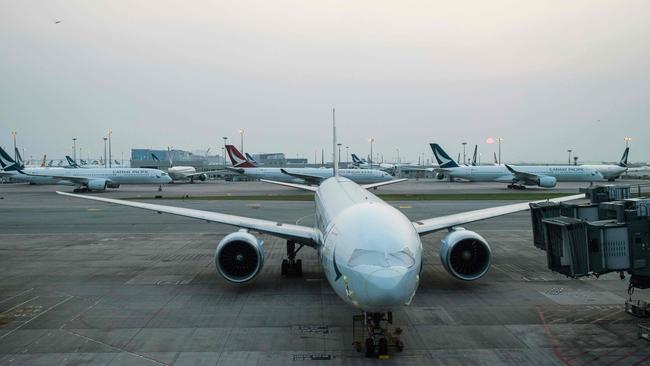
AFP
Jared Lynch 1.21pm: Lockdown is ‘stifling innovation’: Whispir chief
Melbourne’s ongoing hard lockdown is stifling innovation in Australia’s second most populous city, according to the chief executive of cloud-based communications provider Whispir.
Chief executive Jeromy Wells says the current blanket ban and the rigidity of Melbourne’s lockdown needed to be re-assessed, saying there was scope for “more innovative ways to get businesses back on the road”.
“The blanket ban and really rigid structure doesn’t allow for innovation. It doesn’t allow for small easing back into things like more flexible hours, people doing things in a lighter way rather than just ‘nup, business is shut down’,” Mr Wells said.
“It requires trust and people working responsibly but I don’t think it’s necessary to have the very hard lockdown of the kind that we have today.”
Mr Wells‘ comments come after a group of chief executives - including BHP Billiton’s Mike Henry, CBA’s Matt Comyn, Orica’s Alberto Calderon and Coca-Cola Amatil’s Alison Watkins - wrote a letter to Victorian Premier Daniel Andrews urging him to open up the state faster.
“I really feel for so many small businesses that have just been totally eviscerated by this COVID calamity and it’s dreadful,” Mr Wells said.
“The sooner we can get it open the better.”
Mr Wells was speaking as Whispir posted its strongest quarterly results. Annual recurring revenue jumped 26.7 per cent to $43.7m in the three months ending September 30 - and increase of 3.6 per cent on the June quarter.
The company signed on 35 new customers for the period, including Singapore Post. Mr Wells said customer revenue retention is tracking to achieve 120 per cent this financial year.
Lilly Vitorovich 1pm: Seven announces new program line-up
Seven Network is supercharging its television program line-up with a raft of family friendly shows including Holey Moley, The Voice and Ultimate Tag, plus new drama series RFDS and loads of sport, in a bid to reclaim its ratings crown next year.
Seven’s boss James Warburton says it has an “extremely disruptive schedule and a lot of new content” for 2021, with its new mini golf reality show Holey Moley set to go head-to-head with rival Nine Network’s long-running reality dating show Married At First Sight and Network Ten’s The Amazing Race.
Mr Warburton said Holey Moley, whose premiere this year was delayed because of the coronavirus crisis, is an “extremely family friendly” show, featuring TV host Sonia Kruger and golf legend Greg Norman, that will attract a very different audience to MAFS.
“It’s the No 1 non-scripted show in the US, which has just been commissioned for the third season,” Mr Warburton told The Australian.
Mr Warburton is laser-focused on rebuilding the Kerry Stokes-controlled TV broadcaster after some wins with reality shows Big Brother, Farmer Wants A Wife and SAS Australia since June as part of his content-led growth strategy.
Seven is just half a point behind Nine in this year’s TV ratings battle, although Nine expects to claim the crown for a second year in a row.
12.48pm: Retailers Association ‘optimistic’ on retail figures
Australian Retailers Association chief executive Paul Zahra says the latest retail trade figures could be in interpreted with a sense of optimism ahead of the Christmas period.
The latest ABS figures revealed that retail turnover fell 1.5 per cent from August to September.
“The figures show back to back drops in August and September,” Mr Zahra said.
“We interpret this as an adjustment or normalisation to the trend, which if you strip out the volatility of the past few months, has been quite strong.
“Retail trade was up 5.2 per cent in September, compared to a year ago.
“And when you look at the September quarter, those figures were up 6.8 per cent on year.
“This is a strong trend that we believe is setting us up for a cautiously optimistic Christmas shopping season.”
Lachlan Moffet Gray 12.24pm: Dixon had ‘no formal training’ for Crown board
Former Crown director and ex-Qantas boss Geoff Dixon has told the NSW casino licence inquiry about his role on the casino company’s finance committee, and how he met James Packer.
After interrogating Mr Dixon about his professional history, Counsel assisting Scott Aspinall turned to ask Mr Dixon about the role of the Crown finance committee, which he headed for a time.
“We generally just, any issue that came up to do with general finance of Crown, we looked at them,” Mr Dixon said, adding that the committee did not deal with financial forecasts.
Mr Aspinall also established that Mr Dixon was a member of the remuneration and nomination committee, head of the risk management committee from 2008 to 2019 and head of the Crown Subsidiary from August 2018 until his retirement.
Mr Aspinall asked Mr Dixon if he ever received training when he joined the Crown board.
“Not formal training, obviously I was taken around by the various executives at the time and shown the workings of the place,” Mr Dixon said.
Mr Dixon said he came to be on the Crown broad because “James Packer asked me.”
Mr Aspinall asked Mr Dixon whether he came to know James Packer through a potential privatisation bid of the company considered by Kerry Packer.
But Mr Dixon said he came to know James Packer after meeting him “on a plane” and got to know him better when Mr Packer was a Qantas board member between 2004 and 2015.
Mr Dixon was Qantas CEO from 2001 and 2008.
“Kerry Packer, he rang me once or twice...to ask me why Qantas wanted to put James on the board, and I said that’s a board matter and CEOs don’t do that,” Mr Dixon said.
Mr Dixon said that although “I had spoken to him (James Packer) somewhere along the line and I think he indicated to me that he felt I was doing a good job, whatever I was doing,” he maintained he didn’t come to know the younger Packer well until he was a board member.
However, Mr Dixon said that despite being a friend of Mr Packer he’d “never been to his house, he’s never been to my house” and “I’d be lucky to talk to James once every two years.”
Counsel assisting Scott Aspinall has remarked that almost every Crown board member came to be a director after being invited by Mr Packer.
As Mr Dixon sat on the remuneration and nomination committee, Mr Aspinall asked if he was aware of that fact.
“People were recommended by other people a lot, and must say I never assumed that the people being recommended were as a result of James Packer recommending them,” he said.
“I am surprised to hear that they - Tony Korsanos and Jane Halton were recommended by James, I didn’t have any idea of that.”
“It just does seem quite strange that each director we asked said they were asked to join the board by James Packer, do you agree with that?” Mr Aspinall asked.
Mr Dixon said he was surprised, and Mr Aspinall asked where director nominations came from.
“They came - it may well have been John Alexander, as the CEO of the time, maybe myself, I don’t know, I can’t remember,” Mr Dixon said.
Counsel assisting Scott Aspinall has been challenging Mr Dixon over his role as head of the Crown risk committee, and asked whether if it had been more active, it might have uncovered the risks posed to Crown’s VIP business and their staff in China prior to their 2016 arrests.
Mr Dixon said that the man overseeing the operations at that time, Barry Felstead, was present at board meetings and fielded questions about the business but still failed to inform the wider board.
Commissioner Patricia Bergin interjected to say that Mr Felstead did in fact inform board members about the issues in the VIP business.
“It appears that throughout the times James Packer was chairman of the board...Mr Felstead and Mr Packer were communicating what seems to be quite constant,” she said.
“And you have, on one view of it, a reporting line to the chairman, do you understand that?
“And Mr Johnston who was providing services...as a CPH executive to Crown also attended meetings in respect to the VIP business...and he too was given information by Mr Felstead.”
Mr Dixon slightly relented.
“I don’t think this is all on Mr Felstead’s head, but I still think no matter what there are a lot of things that could have been elevated to the board and the committee by Mr Felstead,” he said.
The inquiry adjourned for lunch and will return at 2pm.
12.05pm: ASX slightly higher at noon
Australia’s share market rose slightly in mixed trading after gains on Wall Street.
S&P 500 futures rose as much as 0.5pc as US lawmakers gave hope of pre-election fiscal stimulus.
But after rising as much as 0.4pc to an intraday high of 6206.3, Australia’s S&P/ASX 200 index index was up just 0.1pc at 6190.
The Energy, Financials, Consumer Discretionary and Industrials stocks outperformed, while the Utilities, Tech, Consumer Staples, Health Care, Materials, Communications and Real Estate sectors underperformed
Woodside jumped 1.8pc after WTI crude oil rose 1.5pc overnight, ANZ led banks with a 1.5pc rise, Tabcorp jumped 6pc after revenue fell just 5.7pc in the September quarter despite lockdowns, and Orora surged 6.4pc on an encouraging trading update.
But APA fell 2pc, CSL fell 0.7pc, Woolworths lost 1.1pc, Fortescue slipped 0.4pc and Goodman Group fell 1.1pc.
Joyce Moullakis 12.04pm: Court to decide on Westpac penalty
Federal Court Judge Jonathan Beach has adjourned a hearing to sign off on a record $1.3bn Westpac financial crimes penalty until Wednesday afternoon.
Labelling the more than 23 million contraventions of the law by Westpac “serious and systemic”, Justice Beach said he wanted to be sure the bank was fixing its systems and processes.
He adjourned the matter until 2:15pm AEST on Wednesday. The Federal Court needs to approve the agreed $1.3bn penalty that Westpac will pay regulator Austrac, referencing a statement of agreed facts the parties made last month.
Austrac’s barrister Wendy Harris said the regulator was continuing to engage with Westpac, and its remediation of systems and processes “is satisfactory”.
Westpac’s barrister John Sheahan said the agreed penalty reflected the “overall seriousness” of the failings at the bank, which were not deliberate.
“Of course it’s (the agreed penalty) not completely scientific and you couldn’t expect that,” he added.
Reference was made to the $700m penalty paid by Commonwealth Bank to Austrac in 2018, and Ms Harris highlighted the larger quantum of Westpac’s penalty was a function of a higher number of contraventions of the law.
“It’s a large penalty, but it is an appropriate penalty,” she said of the Westpac fine.
The $1.3bn penalty agreed to by Westpac is the largest ever for Austrac, surpassing the prior record paid by CBA.
Joe Kelly 11.55am: Retail sales slip
Retail turnover fell 1.5 per cent from August to September, with food retailing and household goods recording falls after a sustained period of elevated sales during the COVID-19 pandemic.
Every state and territory except the Northern Territory recorded falls in retail turnover with NSW, Queensland and Western Australia and South Australia leading the month-on-month declines.
Victoria, which has been beset by extended business shutdowns as a result of the second wave of COVID-19 infections, recorded only a minor fall in September. However, this followed a decline of 12.6 per cent in August when Melbourne was slapped with stage-4 restrictions, while regional Victoria was hit with stage-3 restrictions.
The data shows that Victoria is the only state where retail turnover remains below the levels recorded in September 2019.
11.45am: Orora soars on earnings bump
Orora shares surged 7.6pc to a four-month high of $2.70 as its earnings remain resilient in the face of COVID.
CEO Brian Lowe said Orora’s Australasian Beverage Business saw 1Q EBIT in line with a year ago, while its North American OPS and Orora Visual businesses have seen EBIT ahead of the first quarter of last year.
“As we move further into FY21, the combination of Covid-19 and the pending US election sees some challenge and uncertainty persisting,” he said.
“However, Orora’s businesses continue to prove their strength and resilience, with all three continuing to operate as essential service providers.”
ORA last up 5.6pc at $2.65.
11.44am: Reject Shop slumps on AGM update
Shares in The Reject Shop have slumped in early trade despite the variety store chain flagging cost reductions and a focus on dealing with the challenges created by the COVID-19 pandemic as part of the ‘fix’ phase of its three-phase business strategy.
In an address to shareholders at the company’s annual general meeting this morning, chief executive Andre Reich said that once the The Reject Shop’s cost base was set at a sustainable level, the company would be well-placed to pursue longer-term growth through store network expansion and e-commerce.
“The team has already started looking for new store opportunities across the country and is also in the early stages of trialling an e-commerce offering that complements our established bricks and mortar offering,” he said.
“We are busy repositioning The Reject Shop as the place for all Australians to shop first and save.
“As Australia moves into some uncertain economic conditions, The Reject Shop has a vital role in helping all Australians save money every day.
“I’m confident that the future product range will appeal to a wider group of people, particularly those who want to save money on branded products at low prices and private labelled brands at lower prices.”
Still, shares in the company were trading as much as 9.3 per cent lower at $6.42 each in morning trade.
Ben Wilmot 11.41am: MaxCap secures funding for ‘Park Ave’ project
Real Estate lender and investment manager, MaxCap Group has arranged funding for the $120m “Park Ave” project in South Melbourne through one of it’s large institutional mandates in a further sign of lenders backing residential projects.
MaxCap has been a large scale construction funder through the pandemic committing about $1.5bn since April and the funds will be advanced to finance the mixed-use development in Melbourne.
Located at 39 Park Street, South Melbourne, it comprises 160 apartments with a mix of one, two and three-bedrooms and two retail units over 20-levels.
Milbex Group would develop the project, adding to its portfolio of high-density residential towers across Melbourne.
The project has been sought after by both the owner-occupiers and investors with 60 per cent of the project pre-sold to date.
Lachlan Moffet Gray 11.17am: Dixon ‘concerned’ at compromised reporting
The Crown casino inquiry’s counsel assisting Adam Bell asked former Crown director Geoff Dixon whether he was aware that the Chinese government telegraphed its intention to crack down on foreign gambling promoters well before Crown staff were arrested.
“I really am not sure but I do remember discussions certainly going on that time in the company...about our request that everybody was conducting themselves, our staff and everybody, were conducting themselves in the proper manner.”
Mr Dixon did however remember the arrest of Korean casino staff by Chinese authorities in 2015 being discussed, but cannot recall who was involved in the discussion.
Mr Bell said that Crown executives Barry Felstead, Jason O’Conner and Ishan Ratnam had told the inquiry they were aware of the crackdown, but did not tell the board.
Mr Dixon agreed it represented a failure in the risk management process but could not explain how it occurred.
Another email from Crown’s former man in China Michael Chen from 2015 was displayed, where Mr Chen tells Crown’s Chinese staff about the impending crackdown and about his intention to apply for Singapore Hong Kong work visas for some staff so they could lie to authorities about working in mainland China.
Mr Dixon was not aware of this, or aware that a Crown employee that year had been questioned by Chinese police in Wuhan, with Crown providing a letter to verify his statements.
Mr Felstead knew about this event but only told one board member, Michael Johnston, who did not pass on the information.
Mr Dixon agreed that the lines of reporting were compromised and it represented a corporate governance failure.
“Certainly, it’s not right - compromised, yes,” he said.
“It certainly shows that the management were not reporting as they should have.”
Mr Bell displayed a July 2019 email Mr Dixon sent to company secretary Mary Manos about an in-camera board meeting where a draft report explaining the China arrests was discussed.
The inquiry heard that a number of directors expressed alarms at the content of the report at the meeting, and Mr Dixon said he was one of them.
“It was of deep concern to me as a member of the board.....” he said.
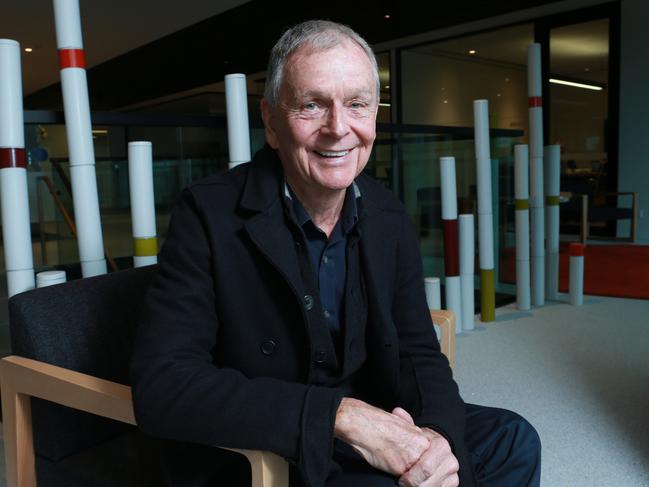
60 Minutes rebuttal
Counsel assisting Adam Bell asked Mr Dixon about whether he watched the 60 Minutes report on Crown when it aired last year.
“No I didn’t, I don’t watch a lot of television,” Mr Dixon said, although he did say he “would have read just about all” the accompanying articles in the Sydney Morning Herald, but not The Age.
Given Mr Dixon understood the allegations made in the media and had his own concerns about corporate governance failures over Crown’s China activities, Mr Dixon questioned why Crown in its advertised rebuttal did not acknowledge it had these concerns.
“Yes I think we should have done that,” Mr Dixon said, adding the advertisement was “done pretty quickly.”
Mr Bell then asked Mr Dixon whether he knew why James Packer stepped down from the Crown board and whether he knew Mr Packer had made threats to a businessman in the context of a discussion to privatise Crown.
“No,” Mr Dixon said, asserting that the rest of the board also had no idea.
Mr Bell then asked Mr Dixon when he first became aware that Mr Packer intended to sell 19.9 per cent of Crown shares to Macau gaming giant Melco.
“I think it was on the news the next day...but certainly I don’t remember finding out that night or whenever it was announced,” Mr Dixon said.
“No one called me to say ‘look we are selling the shares’”.
Mr Bell then showed an email from Crown legal counsel Mary Manos to then Crown chair John Alexander on May 31 2019, the day after the Melco deal was announced.
Within the email Ms Manos tells Mr Alexander that independent directors wanted to meet separately from the Packer-aligned directors to discuss the deal.
Mr Dixon said he would have been one of the directors that raised concerns.
“I expect I would have...I’m not 100 per cent sure it all came from me,” he said.
Mr Dixon agreed that if he had been informed of the transaction in advance, he would have taken steps to ensure it did not in any way violate the regulatory agreement with the NSW gaming regulator underpinning the Barangaroo casino licence.
“This is a sale that by any means raised issues and it was best to get those issues up and running straight away,” he said.
The inquiry took a 10 minute adjournment.
Nick Evans 10.54am: New Century boasts strong cash flow
New Century Resources spent $2.1m on its abandoned bid to buy Vale’s Goro nickel mine in New Caledonia in the September quarter as the company said cash flowing from its Queensland zinc operations was “strongly positive” in the period.
New Century released its quarterly production report on Wednesday, saying it finished September with $34.3m at bank after booking $69.7m in receipts from its customers and repaying $10.3m in borrowings, down from $40m at the end of June.
The company’s Century operations in North Queensland produced 33,633 tonnes of zinc at a concentrate grade of 48.2 per cent in the September period, down from 34,633t at 48.6 per cent in the previous quarter, with the company saying it had been affected by an outage at its processing mill.
Cash production costs for the period rose 6c to 85c a pound in the period, which New Century said was largely the result of the strengthening Australian dollar.
“The marginal addition in C1 costs due to lower metal production was partially offset by a slight reduction in overall treatment charges,” the company said.
Managing director Pat Walta told shareholders a strong finish to the period, however, positioned New Century for a good December period as the company looks to optimise its zinc operations as the commodity price lifts.
“Macro-economic conditions for the industry continue to improve, providing strong tailwinds for New Century, with the zinc price rising above $US1.13/lb for the first time since the onset of Covid-19. In addition, spot treatment charges have plummeted to $US110/t, their lowest level since Century operations restarted,” he said.
“These improving macro conditions have been underpinned on the demand side by strong ‘post Covid-19’ zinc consumption in China, while continued challenges remain on the concentrate supply side, with mine production around the world reduced due to restrictions on human movement.”
New Century shares were up 0.5c to 16c in early trading.
Ben Wilmot 10.48am: Stockland’s monthly run rate moderated: UBS
Stockland’s strongest quarterly result in housing in three years was helped by low interest rates and government stimulus but analyst UBS said that the company’s monthly run rate had moderated from peaks in June and July.
This reflected subdued trading in Victoria and the impact of capacity constraints for customers to access the HomeBuilder grant. Particular strength was seen in Queensland and WA.
“From here we see sales continuing to moderate towards long term averages, in line with monthly enquiries that are trending towards long term averages of 5000-6000 per month, as pent-up demand is satisfied,” UBS analyst Tom Bodor said.
“On the positive side we see support from Victoria reopening and expect government stimulus to be extended though this is balanced by an absence of immigration (demand) and economic uncertainty,” he added.
The next significant news for Stockland was likely to be the new chief executive, and their strategy for the business, he added.
“The solid residential trading should ensure that the capital position is sound and that will give the incoming CEO scope to reposition the portfolio without excessive dilution,” he said.
Stockland shares last up 1 pe cent at $4.12.
Ben Wilmot 10.35am: Commercial market holding up: Dexus
Listed office giant Dexus has struck a series of fresh leasing deals and signalled it is looking to shrug off the bearish outlook for city towers by keeping its distribution in line with last year.
While city towers have been under pressure since the coronavirus pandemic struck Dexus is well advanced on selling about $2bn worth of towers and it believes that the market is holding up.
Dexus expects a full year distribution per security amount that is consistent with fiscal 2020, which was at 50.3 cents.
The company said guidance had been issued as a result of the strength of rent collections and further clarity regarding the extensions related to Morrison government’s leasing code. But it is subject to there being no reinstatement of any major lockdowns or unforeseen circumstances.
“It is encouraging to see the activity across all parts of our business despite the subdued economic conditions. This activity is testament to the quality of the buildings in our portfolio and our extensive relationships with our existing and prospective customers and third party capital partners,” Dexus chief executive Darren Steinberg said.
Dexus said it had maintained high occupancy by leasing a total of 141,388sq m across its office and industrial portfolios. It leased 53,600sq m of office space across 63 transactions in the core portfolio and at development projects.
It also performed well in logistics, leasing 87,788sq m of industrial space across 25 deals.
The company also maintained high rent collections of 94 per cent for the September quarter and completed 180 Flinders Street and 80 Collins Street developments in Melbourne.
The company said it had increased expected trading profits across fiscal 2021 and fiscal 2022 to about $95m before tax after agreeing to sell a property in the Sydney suburb of Gladesville.
Dexus is also expanding its funds unit and has made a play for a major AMP Capital-managed wholesale fund.
Dexus shares last up 2.9 per cent at $9.36.
10.27am: ASX edges higher at open
Australia’s share market rose slightly in mixed trading after offshore gains.
The S&P/ASX 200 rose as much as 0.2pc to 6196 in early trading, led by the Energy, Real Estate, Financials, Communications and Materials sectors.
The major banks rose solidly with ANZ up 0.9pc following US peer gains.
In the Real Estate sector, Dexus, GPT and Stockland rose 1.7pc - 3pc after recent underperformance.
Bulk commodity producers were mainly positive with BHP up 0.5pc and Rio Tinto up 0.7pc.
Woolworths fell 1.1pc despite Citi’s upgrade to a Buy rating.
S&P 500 futures rose 0.5pc after House Speaker Nancy Pelosi said she remains hopeful of a pre-election stimulus deal.
The S&P/ASX 200 was last flat at 6186.
Lachlan Moffet Gray 10.25am: Dixon in the dark on China staff
The NSW Independent Liquor and Gaming Authority’s inquiry into the suitability of Crown Resorts to hold a casino licence in the state has convened for its penultimate hearing.
Giving evidence today is former Qantas boss Geoff Dixon, who was a non-executive director of Crown from 2007 to 2019.
Mr Dixon was scheduled to appear last Wednesday ahead of current chair Helen Coonan, but his appearance was rescheduled.
Counsel assisting Adam Bell is asking questions today and has begun by probing Mr Dixon on his knowledge of Crown’s activities in China prior to the 2016 arrest of 19 Crown staff for illegally promoting gambling to Chinese citizens.
Mr Dixon, unlike other directors, claims that he knew Crown had staff in China prior to their arrest.
He also said he read legal advice about Crown’s activities in the country, but cannot recall the specifics.
“I knew that we could not conduct an office and knew that we were told and always told by the executive management that we were operating in China legally,” Mr Dixon said, claiming that he thought the staff in China were working from their homes.
In fact, Crown staff were working out of an office in a residential area in Guangzhou leased in the name of Crown staff without signage.
Mr Dixon said he did not know about this and agreed with Mr Bell in that the risk management committee, which he chaired at the time, should have been alerted to this.
Mr Dixon said he could offer no explanation as to why this did not reach him.
“Well we were assured...by senior executive management that we were not in any way breaking the law in China,” Mr Dixon said, pointing to the soon to be made redundant head of Australian resorts as one of the executives that made such assurances.
“Certainly Mr Felstead, Barry Felstead, as the person who had carriage of all of this,” he said.
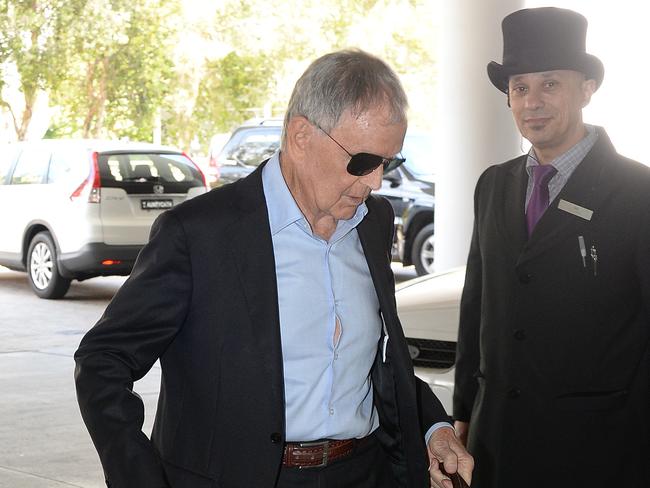
Counsel assisting Scott Bell turned to the full-page advertisement the Crown board released following numerous allegations made against the company by the media last year.
The advertisement rebutted several allegations, including that it knew it was operating in China in a legal grey area and that it did not vet the gambling promoters, or junkets, that it partnered with.
Like other board members who gave evidence, Mr Dixon said he was assured the advertisement was factual based on advice from Barry Felstead and others.
Displaying a 2015 email from Crown’s former man in China, Michael Chen, to a Beijing external lawyer, Mr Bell noted that Mr Chen was seeking advice over whether Crown staff should leave the country due to an already underway government crackdown on gambling promoters.
Mr Dixon said he was not aware that this legal advice was sought, only that executives weren’t travelling to China as much as they used to at the time, and he did not realise when he signed the advertisement that Crown management did not seek legal confirmation of this advice sought from the external lawyer.
He was also not aware of the finer legal distinctions Crown made to justify their activities.
“I would say that the very fact when you’re dealing with risk management, the biggest risk, the one you consider is doing business in China,” Mr Dixon said.
“How you manage the risk after that - I think every Australian company is finding that out now.”
Mr Dixon could not explain why executives who were aware of the issues in China, such as Barry Felstead, did not inform the full board.
“I can only assume that some of them were making value judgments when they probably should have been making critical judgments about activities up there,” he said.
Nick Evans 10.20am: Lynas is ‘cash flow positive’
Rare earths producer Lynas says its operations were cash flow positive in the September quarter, as demand and pricing recovered from the coronavirus crisis.
Lynas reversed the trend from its June quarter, booking $71.8m in receipts from customers, on operating costs of $57.4m. In the June quarter it was paid $42.1m for sales of its rare earth products, with costs of $51.4m.
Chief executive Amanda Lacaze said Lynas’s Malaysian processing facilities were still running at only 75 per cent capacity, which was “sufficient to meet demand from our customers while COVID-19 uncertainty remains”.
“The company remained cash flow positive during the quarter, as we capture efficiencies while running production at original name plate,” she said.
The company said demand from customers in some sectors, including manufacturers servicing the petroleum industry, staged a partial recovery through the September quarter. But sales to the automotive sector remained “subdued”.
“A full assessment of global rare earth demand will not be possible until the global COVID-19 situation is more stable. However, positive news continued to support the magnet market, as the EU decided to accelerate the decarbonisation of its economy, now targeting a 60 per cent reduction of emissions by 2030 compared to 1990, instead of the 40 per cent previously targeted,” the company said.
“During the September quarter, rare earth prices were quite volatile. While global demand for magnets appears to still be affected by the COVID-19 situation, a focus on the projected significant increase in demand from accelerating electric and hybrid vehicle production sustained the price above $US40/kg.”
Lynas shares last traded at $2.87.
10.15am: Domino’s on ‘lofty’ valuation
Citi’s Craig Woolford says Domino’s is trading on a “lofty” PE valuation of 46 times expected FY21 earnings as the market expects it to expand its global footprint.
He has looked at company-specified criteria to derive a short list of nine countries, with a combined population of 275 million compared with Domino’s existing markets of 339 million.
“In our view, Korea and Poland would be logical additions given that the upside to store count could be at least 500,” he says.
“With a high scrip and low cost of debt, an acquisition could add $11 per share in value.”
But while noting that the near-term outlook is positive, he says Domino’s share price is more than factoring in good news.
While lifting its FY21e EPS forecast by 4pc and FY22 by 1pc, Mr Woolford has a Sell rating and $67.40 price target.
“We expect the lack of operating leverage to strong sales growth to be a catalyst for share price downside,” he says.
DMP shares last $92.46.
Cliona O’Dowd 10.13am: Future Fund lifts funds 1.1pc
The nation’s sovereign wealth fund grew its funds under management by 1.1 per cent in the September quarter and has boosted its cash position as it readies to “take advantage of opportunities that arise in the current market”.
The Future Fund was sitting on funds of $163bn at the end of September, up from $161bn at the end of June, and has earned over $102bn since its inception in 2006.
But it is still counting the cost of the sharemarket crash earlier this year, with its one-year return in negative territory at -1.8 per cent.
Total funds under management, which include the Medical Research Future Fund, stood at $210bn at the end of the September quarter.
Over the same period, the fund bolstered its cash holdings to $31.2bn, up from $27.4bn at the end of June.
10.11am: Woolworths upgraded
Citi’s Bryan Raymond has upgraded Woolworths to Buy while also raising its target price 8pc to $44.50 reflecting a rational grocery market, strong earnings momentum and appealing relative valuations.
“We have a preference for Woolworths within grocery given sales momentum into the 1Q21 sales result, but continue to see better long term growth opportunities for Coles and Metcash given the abundance of low hanging fruit in both businesses,” he says.
Lachlan Moffet Gray 9.58am: Charges laid over alleged NAB fraud bid
A former National Australia Bank employee has been charged with an alleged attempted fraud against the bank valued at more than $21 million.
Police allege a criminal syndicate used fraudulent bank deposit guarantees to purchase properties across the state, for an inflated commission.
The 38-year-old former employee was arrested on October 8 and charged with nine offences relating to dishonestly obtaining financial advantage by deception and engaging in criminal activity.
Police will allege in court that she was involved in an attempt to defraud the financial institution of more than $21.6m.
She was granted conditional bail to appear at Downing Centre Local Court on Friday 27 November 2020.
It follows the arrest on September 30 of 47-year-old Srinivas Naidu Chamakuri following a search of his home in Sydney’s west in August.
Mr Chamakuri has been charged with 11 offences relating to participating in criminal activity and dishonestly obtaining financial advantage, as well as five counts of dealing with an identity to commit indictable offence.
It will be alleged in court that he was involved in attempting to defraud a financial institution of more than $16.8 million.
He was granted conditional bail to appear at Fairfield local court today
Financial Crimes Squad Commander Detective Superintendent Linda Howlett, said investigators have worked with NAB to investigate the alleged criminal syndicate.
“NSW Police have worked collaboratively with the National Australia Bank (NAB) to investigate this serious and coordinated attempted fraud,” Det Supt Howlett said.
NAB’s executive group investigations and fraud Chris Sheehan said the bank had terminated the employee.
“It is important to note no NAB customers were impacted and no financial loss occurred as a result of the actions alleged by police, and the former employee was dismissed by NAB.”
Investigations are continuing and further arrests are expected.
9.52am: St Barbara maintains production guidance
Gold miner St Barbara has maintained its production guidance as it delivered lower production figures for the first quarter of the new financial year.
The company produced 72,990 ounces of gold in the September quarter, down from 87,569 ounces in the same period a year ago. That was impacted by a scheduled shutdown of its Gwalia Mine in Western Australia, which ran overtime.
“Delivering on our potential in a timely, cost‐appropriate way is key to driving deliberate and value‐accretive growth,” said chief executive Craig Jetson said in a statement to the market this morning.
“In the second quarter of FY21, we will elaborate on our aspiration to unlock value in our organisation, improve safety, deliver cost savings and improve our productivity.”
The company told investors that it continued to build on its Building Brilliance strategy, which focused on lifting performance by safely increasing productivity and reducing costs.
St Barbara maintained its guidance of full-year gold production of between 370,000 and 410,000 ounces at an AISC of between $A1,360 and $A1,510 an ounce.
9.47am: What’s impressing analysts?
Stockland cut to Neutral: Macquarie
James Hardie raised to Outperform: RBC
Nine Entertainment cut to Sell: Morningstar
Pacific Smiles cut to Hold: Bell Potter
Sydney Airport cut to Underweight: JPMorgan
Coca-Cola Amatil raised to Overweight: JPMorgan
Woolworths raised to Buy: Citi
9.41am: ASX to rise after Wall Street gains
Australia’s sharemarket should get a boost from overnight gains on Wall Street and expectations of further US gains on Wednesday.
S&P/ASX 200 futures relative to fair value had pointed to an early rise of 0.1pc, but US futures are up about 0.2pc despite a 6.7pc afterhours fall in Netflix on slower subscriber growth.
While giving up two thirds of a 1.5pc intraday rise in regular trading, the S&P 500 closed up 0.5pc as some US lawmakers gave hope of a pre-election deal on fiscal stimulus and Moderna and AstraZeneca gave hope of coronavirus vaccines.
The Energy and Financial sectors led gains, with the KBW Bank index up 1.6pc.
That could see Australia’s S&P/ASX 200 Banks index maintain pressure on its 200-day moving average resistance line.
While the S&P 500 Materials sector underperformed,BHP ADR’s equivalent close at $36.30 was a 1.1pc premium to BHP’s Sydney close.
In commodities, WTI crude rose 1.2pc to $US41.55, spot iron ore rose 0.1pc to $US119.5.2, LME copper rose 2pc and nickel gained 2.3pc and zine rose 1.8pc.
On the chart, the S&P/ASX 200 may be establishing support at the lower end of former highs in the 6160-6200 area.
Recent technical developments have been very encouraging, with the basic 50, 100, 200 day moving average study turning positive on Tuesday.
While the US faces the risk of a contested election outcome, delayed fiscal stimulus and worsening coronavirus trends, a stimulatory federal budget is expected to be followed by RBA rate cut rates and the start of QE in Australia next month.
The S&P/ASX 200 fell 0.7pc to 6184.6 on Tuesday.
Bridget Carter 9.40am: Universal Store sets IPO price
Universal Store has locked in the price for its initial public offering at $3.80 per share.
The youth fashion retailer will have a $278.1m market value and raise $147.8m for its IPO.
The price represents 14 times the company’s earnings.
Once listed, Brett Blundy’s BB Retail Capital will reduce its stake to 16.39 per cent from 38.03 per cent, Five V Capital will reduce its interest to 6.38 per cent from 14.81 per cent, Mountainview Trust to 6.15 per cent from 14.26 per cent and Catalyst Direct Capital Management will reduce its interest to 2.15 per cent from 3.57 per cent.
The company will start trading on a deferred settlement basis on November 16 after its prospectus is lodged on October 28.
9.30am: US stimulus talks to continue
White House and Democratic negotiators said they would press ahead with efforts to reach a sweeping coronavirus relief deal after making progress Tuesday, even as the prospect of a roughly $US2 trillion package sparked opposition from Senate Republicans.
House Speaker Nancy Pelosi had indicated that she hoped to pin the White House down on enough issues by the end of the day Tuesday (US time) to be able to determine whether a deal could be passed before the November 3 election. After today’s (AEDT) discussion, both sides said they were willing to continue their discussions without decisively establishing whether a deal will be possible.
“Their conversation provided more clarity and common ground as they move closer to an agreement,” Drew Hammill, Mrs. Pelosi’s spokesman, said in a tweet after Mrs Pelosi spoke with Treasury Secretary Steven Mnuchin for roughly 45 minutes.
The self-imposed Tuesday (US) deadline enabled negotiators “to see that decisions could be reached and language could be exchanged, demonstrating that both sides are serious about finding a compromise,” Mr. Hammill said.
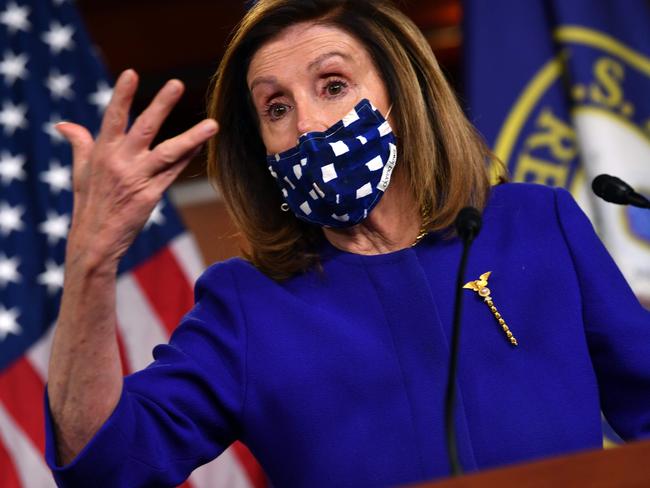
White House chief of staff Mark Meadows said on CNBC that the day’s talks had been “productive enough to continue to have discussions tomorrow,” adding that Mrs. Pelosi and the administration were now trying to secure “some kind of agreement before the weekend.”
Any deal approaching $US2 trillion would encounter deep resistance in the GOP-controlled Senate. Senate Majority Leader Mitch McConnell told Senate Republicans at their weekly lunch Tuesday that he had advised the White House not to divide the Senate GOP right before the election and that a $US2 trillion relief bill would split the caucus, according to people familiar with the comments.
President Trump on Tuesday said he would be willing to support a larger spending level than Mrs Pelosi, but offered few details on what that would look like. In the face of Senate GOP resistance, he said he would be willing to pass the bill with largely Democratic votes.
The White House’s latest $US1.88 trillion offer narrowed the difference with the $US2.2 trillion relief bill passed by House Democrats earlier this month, but a new overall spending level hasn’t been agreed upon.
Mr. Meadows said the two sides remained “several hundreds of billions of dollars” apart, as well as still trying to hammer out policy divisions.
“We’re not just down to a difference of language and a few dollars. We still have a ways to go,” he said. Mrs. Pelosi had asked Democratic committee chairs to work with their GOP counterparts to hash out some policy disputes.
Dow Jones Newswires
8.57am: Copper at two-year high
The copper price rose to a two-year high overnight on a stronger renminbi, and after Toronto-headquartered Lundin Mining flagged plans to suspend operations at its Candelaria copper mine in Chile due to labour strikes.
Chile’s Candelaria copper mine makes up about 0.9 per cent of the world’s copper mine supply.
The spot copper price lifted 1.8 per cent overnight to $US6,879 a tonne.
“A strengthening Chinese renminbi, which increases the purchasing power of China, also helped copper and other mining and energy commodity prices higher,” said Commonwealth Bank mining and commodities research director Vivek Dhar.
“The renminbi is at the highest level since July 2018.
“Hopes of a last-minute US fiscal package prompted commodity prices, particularly oil, higher too.”
8.55am: Temple & Webster revenue up 138pc
Online homewares retailer Temple & Webster says the new financial year has started strongly, with year-to-date revenue up 138 per cent on the prior corresponding period.
In an update released to the market ahead of the company’s annual general meeting today, Temple & Webster said October revenue growth was in excess of 100 per cent, which it said was pleasing given it had entered its peak trading period.
“We are committed to a high growth strategy to take advantage of the structural shift towards online, capitalising on both organic and inorganic opportunities,” the company’s chief executive Mark Coulter will tell shareholders at the AGM today.
“Even though the world is in uncertain times, we remain committed to our longer-term strategy of investing to ensure Temple & Webster is the brand for the next generation of furniture shoppers.
“We believe that online shopping habits are being formed right now, and provided we keep putting the customer at the heart of everything we do, those habits will remain.”

8.47am: US stimulus deal ‘closer’
House Speaker Nancy Pelosi and Treasury Secretary Steven Mnuchin “moved closer” to a deal on a sweeping coronavirus package, though divisions remain, and agreed to continue negotiations Wednesday, her spokesman said on Twitter.
More to come
The Speaker and Secretary Mnuchin spoke at 3:00 p.m. today for approximately 45 minutes. Their conversation provided more clarity and common ground as they move closer to an agreement. (1/3)
— Drew Hammill (@Drew_Hammill) October 20, 2020
On several open questions, the Speaker and the Secretary called for the committee chairs to work to resolve differences about funding levels and language. With this guidance, the two principals will continue their discussions tomorrow afternoon upon the Secretary's return. (3/3)
— Drew Hammill (@Drew_Hammill) October 20, 2020
7.33am: Netflix subscriber growth slows
Netflix said subscriber growth slowed in the third quarter, highlighting the fresh challenges the company faces from competitors ramping up their own streaming services as the coronavirus pandemic continues to disrupt the entertainment industry.
Netflix reported that it added 2.2 million subscribers in the quarter on a net basis, short of its forecast in July of 2.5 million new subscriptions for the period. The most recent gain is smaller than those Netflix reported for the first and second quarters, when it added 15.8 million and 10.1 million subscribers, respectively.
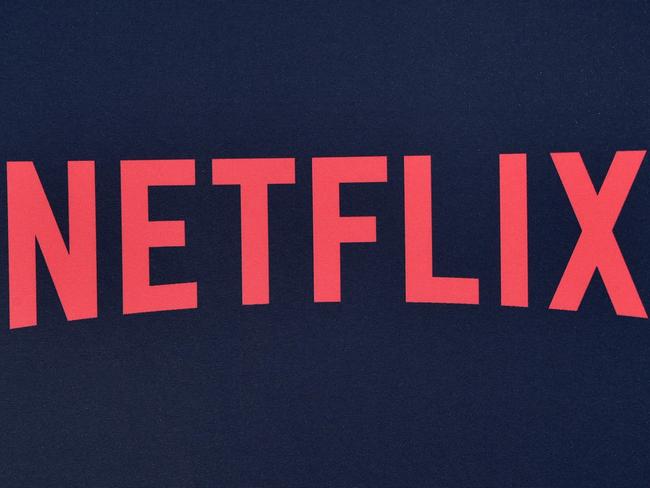
The streaming giant’s ability to reel in subscribers during the first half of the year marked it as one of the companies that benefited from the pandemic. Consumers moved to purchase Netflix subscriptions as COVID-19 initially spread and officials locked down economies, resulting in millions of people spending more time at home. The suspension of professional sports leagues, cancellation of events like concerts and closure of movie theaters earlier this year reduced competition.
Executives at the Los Gatos, California-based company previously warned that growth had been pulled forward amid the pandemic and said they expected subscription increases to lessen during the second half of 2020. Meanwhile, sports have resumed, more people have been traveling and cinemas have reopened.
“As we expected, growth has slowed,” the company said in a letter to shareholders.
Netflix shares fell 5.4pc in after-hours trading.
Dow Jones
The Daily Table: a wrap of overnight markets #ausbiz #ausecon #bonds #rates #fx #markets #audusd #aud #usdaud #metals #LME #metalprices #ironore #commsec @CommSec pic.twitter.com/T2IJXnFiz8
— CommSec (@CommSec) October 20, 2020
7.26am: US lawmakers more optimistic on stimulus
Chances for approving a new spending package to support the US economy improved dramatically after the senior Democratic lawmaker said a bill is in the works and the top Senate Republican said he would bring it to a vote.
US House Speaker Nancy Pelosi said on Bloomberg TV that legislators are starting to commit the measure to paper and she is optimistic it can win bipartisan support.
Whether policymakers can complete the negotiations in time for Congress to approve the package before the November 3 presidential election, however, remains a question mark.
“Our economy needs it. Hopefully by the end of the day today, we will know where we are,” she said in an interview. “We are starting to write the bill.” While it must go through legislative steps, including approval by the House Appropriations Committee, “I am optimistic,” Pelosi said, but cautioned “Legislation is tough.”
The bill’s prospects got a boost after Senate Majority Leader Mitch McConnell, who repeatedly signaled that he would not support a massive package, said he would bring the measure to the Senate floor for a vote.
Economists say the coronavirus-ravaged US economy has held up well because of the massive injection of about $US3 trillion in support for businesses and households, but needs more support to avert another downturn.
The talks between the White House and congressional Democrats have dragged on for months, and Pelosi was due to speak with Treasury Secretary Steven Mnuchin to see if the sides can finally narrow their differences.
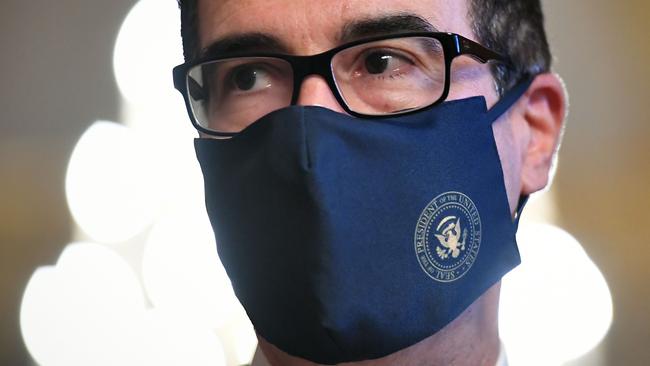
AFP
7.20am: ASX to open higher
Australian stocks are tipped to open higher after gains on Wall Street, where major indexes were higher in afternoon trade on renewed stimulus hopes.
Around 7am (AEDT) the SPI futures index was up 10 points, or 0.2 per cent.
On Tuesday, Australian stocks closed lower after Wall Street sank on dwindling hopes for a fresh US stimulus package.
The Australian dollar was lower at US70.64.
Brent oil is up 1.3 per cent to $US43.16.
7.18am: Snapchat nears 250m daily users
Snap Inc’s revenue surged in the latest quarter, as the company attracted more advertisers to Snapchat in a bid to meet consumers who are spending more time online and on mobile devices due to the coronavirus pandemic.
Snapchat added 11 million users from the prior quarter to end the September period with 249 million daily active users. The user growth was well ahead of Wall Street analysts’ forecasts and showed that the platform could see strong engagement even with the emergence of TikTok and strong results earlier this year from Facebook Inc.’s networks.
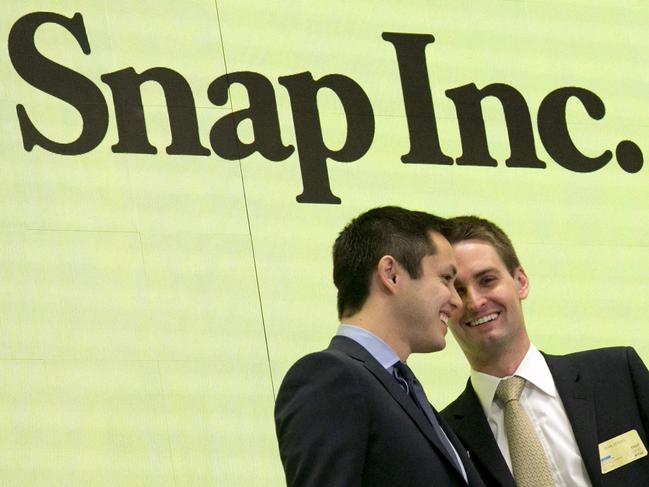
Snap’s revenue rose 52pc to $US678.7 million for the September quarter, well ahead of analysts’ estimates of $US557 million, according to a FactSet poll.
Chief Executive Evan Spiegel said that he was pleased with the company’s growth in the period and that it will continue long-term investments on things including augmented reality for its app.
Dow Jones Newswires
7.07am: US stocks gain ahead of stimulus talks deadline
Wall Street finished higher on optimism that Congress would reach an agreement on a spending package to support American households and businesses through the pandemic.
The S&P 500 added 0.5 per cent, taking back some of its losses from earlier in the week. The broad-market index fell 1.6 per cent on Monday as investors grew concerned that lawmakers weren’t making progress on a deal.
The Dow Jones Industrial Average, meanwhile, rose 0.4 per cent. The tech-heavy Nasdaq Composite Index advanced 0.3 per cent. All three major US indexes were higher earlier in the session.
House Speaker Nancy Pelosi has indicated that the White House needs to reach a deal with Democrats by the end of Tuesday (US time) if the government wants to pass the next coronavirus-relief bill before Election Day. The California Democrat and Treasury Secretary Steven Mnuchin have edged closer on some policy differences recently, Mrs Pelosi said Tuesday, but disputes remain.
“There has to be some form of a deal: the most likely outcome is that they’ll have to do something. Given what’s happening with Covid, the economy needs some support and markets need some form of guidance,” said Peter Dixon, an economist at Commerzbank. But “we are really running out of time,” he cautioned.
Markets have swung in recent weeks on every twist in the talks. If passed, the stimulus package could drive a further rally in stocks.
In bond markets, the yield on the benchmark 10-year U.S. Treasury note ticked up to 0.796pc, from 0.760pc on Monday.
Investors are also continuing to assess the elevated number of new coronavirus infections in the US and Europe in recent weeks. Restrictions in some countries including the UK and France have been tightened, though most governments have avoided halting business activity completely, shielding the economy from the worst of the fallout.
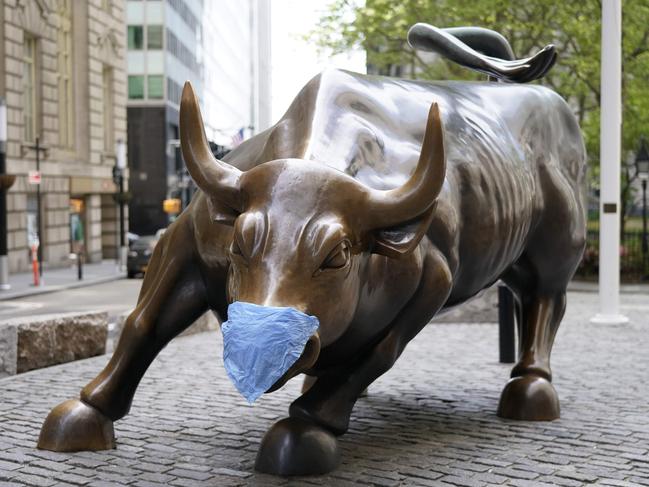
In economic data, permits for new construction in the US were at 1.553 million in September, rising moderately compared with the previous month. The figures were slightly above economists’ expectations, reflecting a continued recovery in the bedrock industry.
The rise in permits shines a bright light on the economy, said Michael Sheldon, chief investment officer at RDM Financial Group. He said this is in line with other housing data that has recently been released.
Overseas, the pan-continental Stoxx Europe 600 fell 0.4 per cent.
Dow Jones Newswires
6.25am: NZ names lead managers for bond offer
The New Zealand Treasury Department named lead managers for a syndication of the government’s May 2028 bond and said the bonds could be offered next week.
The bond sale would be subject to market conditions, the Treasury said. It said UBS, BNZ, Westpac and ANZ will be joint lead managers.
The government has significantly stepped up its borrowing to finance increased spending in response to the coronavirus pandemic. Net debt as a percentage of the economy is forecast to nearly triple over the next several years.
Dow Jones Newswires
6.07am: Wall Street rises on stimulus hopes
US stocks rose on optimism that Congress would reach an agreement on a spending package to support American households and businesses through the pandemic.
IN afternoon trade the S&P 500 added 0.5 per cent, taking back some of its losses from earlier in the week. The broad-market index fell 1.6 per cent Monday as investors grew concerned that lawmakers weren’t making progress on a deal.
The Dow Jones Industrial Average, meanwhile, rose 0.4 per cent. The tech-heavy Nasdaq Composite Index advanced 0.3 per cent.
House Speaker Nancy Pelosi has indicated that the White House needs to reach a deal with Democrats by the end of Tuesday (US time) if the government wants to pass the next coronavirus-relief bill before Election Day. The California Democrat and Treasury Secretary Steven Mnuchin have edged closer on some policy differences recently, Ms. Pelos said Tuesday, but disputes remain.
“There has to be some form of a deal: the most likely outcome is that they’ll have to do something. Given what’s happening with Covid, the economy needs some support and markets need some form of guidance,” said Peter Dixon, an economist at Commerzbank. But “we are really running out of time,” he cautioned.
Markets have swung in recent weeks on every twist in the talks. If passed, the stimulus package could drive a further rally in stocks.
Investors are also continuing to assess the elevated number of new coronavirus infections in the US and Europe in recent weeks.
Dow Jones
6.00am: UBS profit doubles on trading surge
UBS Group said its net profit nearly doubled in the third quarter on a surge in client trading and deal making, freeing up cash for dividends and share buybacks despite the coronavirus pandemic.
The results highlight a growing divide between stronger and weaker banks in Europe as the pandemic hits some countries and business models harder than others. UBS’s investment bank, like others, is benefiting from higher-than-usual customer activity while its wealth-management arm has gained net new money from clients to invest as global wealth rebounds from a spring rout.
Most of the Swiss bank’s lending is to the world’s rich and to Swiss households and businesses, areas that have held up relatively well in the pandemic. Many large U.S. and European rivals, in contrast, have taken hefty provisions on their consumer and corporate loans to reflect weaker economic outlooks than in Switzerland.
UBS said it set aside $US1.5 billion to repurchase shares next year and has accrued $US1 billion in cash for 2020 dividends. A delayed dividend from 2019 will be paid next month, UBS said. It had conserved the cash earlier this year after Swiss regulators asked banks to do so.
Net profit rose to nearly $US2.1 billion from $US1.05 billion a year earlier. Loan losses in the period were $US89 million, lower than the $US268 million and $US272 million provisions taken in the first and second quarters, and well below the levels of many rivals.
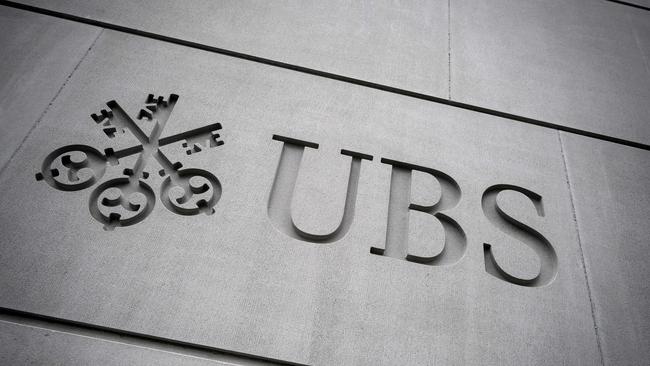
Dow Jones
5.57am: Pelosi, Mnuchin in final push on stimulus talks
White House and Democratic negotiators were taking a final shot at determining whether a deal on a coronavirus relief package is feasible before the election, grappling with longstanding differences on issues including state and local funding and liability protections.
“Hopefully by the end of the day today, we’ll know where we all are,” said House Speaker Nancy Pelosi on Bloomberg television.
Separately, the Senate was prepared to consider later Tuesday (US time) a stand-alone small-business aid bill, which Democrats were expected to block.
Mrs. Pelosi over the weekend said she and Treasury Secretary Steven Mnuchin would need to determine by the end of day Tuesday whether there was enough consensus to produce an agreement before the Nov. 3 election. Mrs. Pelosi and Mr. Mnuchin, who have been talking regularly, were expected to speak again midafternoon Tuesday.
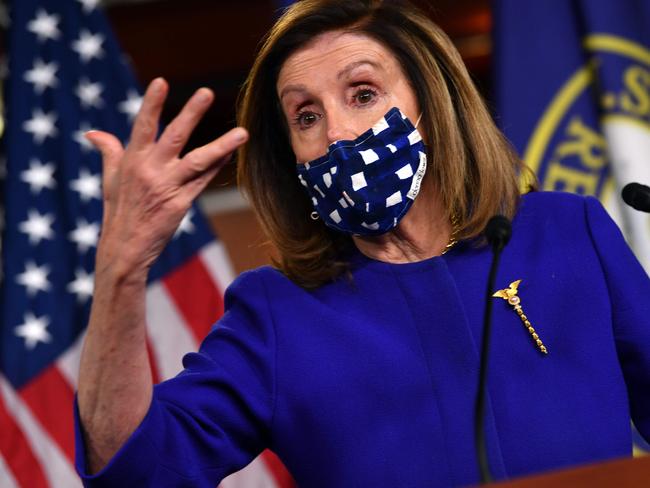
The White House’s latest $US1.88 trillion offer narrowed the difference with the $US2.2 trillion relief bill passed by House Democrats earlier this month, but a new overall spending level hasn’t been agreed upon.
After months of start-and-stop negotiations, there was scepticism among congressional aides from both parties that a deal was near. Republicans worried that Mr. Mnuchin was ceding too many policy points to Mrs. Pelosi in an effort to deliver a deal to Mr. Trump, securing a last-minute legislative victory two weeks before the election.
Dow Jones
5.15am: Goldman to pay $US2.8bn in 1MDB case
Goldman Sachs Group will pay the US government about $US2.8 billion and admit wrongdoing in a Malaysian bribery scandal, settling charges stemming from its work with a corrupt government investment fund.
A Goldman subsidiary tied to the misconduct in Asia is expected to plead guilty this week, according to people familiar with the matter. The bank’s parent company will admit fault but won’t face prosecution under the agreement, the people said, avoiding a guilty plea that could have crippled its ability to do business.
The arrangement, known as a deferred prosecution agreement, would allow the U.S. Justice Department to pursue charges later if Goldman errs again during a specified time period.
The settlement caps a year-long scandal that stretched from Southeast Asia to Hollywood, the Middle East, Las Vegas and London. In July, Goldman agreed to pay Malaysia $US2.5 billion for its role in the alleged theft of billions of dollars from the investment fund, known as 1MDB.
The deal with the Justice Department calls for Goldman to pay a penalty of about $US2.2 billion plus about $US600 million in ill-gotten gains, although the firm will be able to offset some of that with fines paid to other authorities and agencies, the people said.
Dow Jones
5.10am: Traders scramble after outages
Traders and investors across Europe scrambled to understand how a series of failures at one of the continent’s biggest exchange-operators had affected their positions in stocks, bonds and derivatives.
Trading resumed after technical problems disrupted multiple bourses owned by Euronext NV on Monday, including stock exchanges in Paris, Amsterdam and Dublin. Activity was muted to begin with Tuesday before picking up speed as the session progressed, traders said.
But the outages left some companies with unintended exposures to asset prices and for a time unsure whether a portion of the trades they placed on Monday had gone through. The difficulties raised concerns about risks stemming from the ownership of several trading venues by one operator, some traders and industry participants said.
The interruptions were caused by a technical problem affecting a so-called middleware system used to manage the storage of data, a Euronext spokesman said Monday. The spokesman didn’t immediately respond to queries about the effects of the outages on market players, or the potential risks of concentrating several exchanges under one operator.
But computing specialists said that explanation left open several possibilities of what might have gone wrong. Middleware is a broad term for software that enables communication between other pieces of software, or between an operating system and applications.
Dow Jones
5.05am: Stocks mixed as US stimulus hopes fade
Global stocks were mixed ahead of a looming deadline for a pre-election US stimulus package, dealers said.
In Europe, London finished the day slightly higher than it began, while stock indices in Paris and Frankfurt wallowed in negative territory.
New York markets were doing well in midday trading after US housing starts rebounded slightly in September.
Oil prices slipped lower a day after OPEC and other major crude producers refrained from altering output policy despite weak virus-hit demand and stubborn oversupply.
Meanwhile, US Democrats and Republicans wrangled over a new COVID-19 stimulus package.
House Speaker Nancy Pelosi has set a Tuesday deadline, fuelling fears that nothing will be approved before the November 3 presidential election.
“The likelihood of a deal taking place appears no more likely now than it was a week ago, with the window for it happening... closing fast, as tonight’s Pelosi-imposed Tuesday deadline for getting a deal agreed comes into view,” said CMC Markets analyst Michael Hewson.
But Fawad Razaqzada at ThinkMarkets.com felt that the fact that markets were not doing too badly “suggests that investors are convinced that it is just a question of when rather than if the US stimulus package will be signed.”
Pelosi’s spokesman said she held talks with Treasury Secretary Steven Mnuchin on Monday and would do so again Tuesday, adding that they continued to narrow their differences.
But even if they reach an agreement -- with US President Donald Trump saying he is happy to top Pelosi’s $US2.2 trillion proposal -- Senate Republicans would likely still not be prepared to back a massive spending bill.
AFP
5.05am: Tesla to export cars made in China to Europe
Tesla will this month begin exporting cars to Europe that are made at its new factory in Shanghai, the fast-growing US electric carmaker has announced.
The Model 3 vehicles will be shipped to more than 10 countries including France, Germany, Italy and Switzerland, the group said in a statement.
“This decision is evidence of the excellence of Chinese manufacturing,” the company said.
Last year, Tesla built its third factory in China’s financial capital in a record 10 months. It already has facilities in New York and Nevada.
The first factory outside the United States should offer Tesla key access to China’s auto market, which is now the largest both in the world and for the US company.
AFP
5.00am: US suing Google in antitrust case
The US government has sued Google, accusing the Silicon Valley titan of maintaining an “illegal monopoly” in online search and advertising, in the country’s biggest antitrust case in decades, opening up the door to a potential break-up of the company.
The politically charged case, which could take years to play out, opens up a new battle between the US government and Big Tech with potentially major implications for the sector.
Deputy Attorney General Jeffrey Rosen said the case filed with 11 states takes aim at Google’s dominance of the online ecosystem.
“Google is the gateway to the internet,” Rosen told reporters, citing the company’s billions in payments to device makers to remain the primary search engine.
“It has maintained its monopoly through exclusionary practices that are harmful to competition.”
The lawsuit filed in Washington contends Google’s actions shut out competitors and proposes that the court consider a range of remedies including a possible break-up, offering few specifics.
The filing calls for the court to “enjoin Google” from anticompetitive practices and consider “structural relief as needed to cure any anticompetitive harm,” which would mean structural changes to the tech titan.
Asked about how officials would seek to break up Google, Rosen deferred, saying, “the litigation will have to proceed a little further before we would want to set out specifics.” Google called the lawsuit “deeply flawed.” “People use Google because they choose to -- not because they’re forced to or because they can’t find alternatives.”
The move comes after months of investigations by US federal and state antitrust enforcers seeking to check the power of the massive technology firm and parallel probes into other titans such as Amazon, Facebook and Apple.
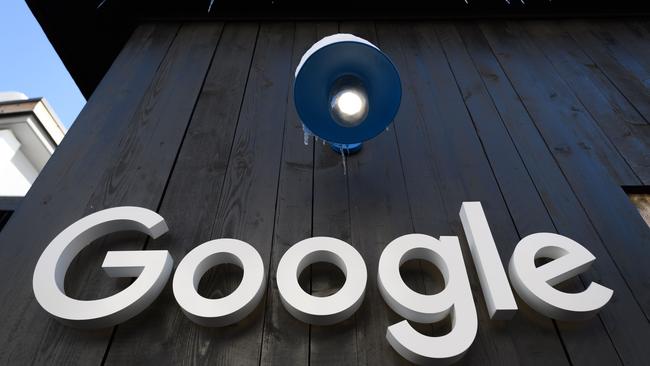
AFP
4.58am: Lufthansa loses 1.26bn euros
German airline Lufthansa reported a loss of 1.26 billion euros ($US1.49 billion) in the third quarter of 2020 as it struggles to bounce back from crippling coronavirus lockdowns.
The sobering figure is a slight improvement on quarter two’s loss of 1.5 billion euros “due to an expansion of the flight schedule in the summer months of July and August and considerable cost reductions”, the airline said in a statement.
But demand for air travel is expected to remain low in the coming months “due to the global evolution of the pandemic and the associated travel restrictions”, it said.
The group therefore plans to operate at just 25 per cent capacity in the fourth quarter compared with the same period last year.
AFP
4.57am: US housing starts posts modest rebound
US housing starts rebounded slightly in September as construction firms struggle to satisfy booming demand from home buyers, the government reported.
The housing market has been one of the few bright spots in the US economy as it struggles with the world’s worst coronavirus pandemic, helped by record low borrowing rates, and Commerce Department data showed home construction started last month rose 1.9 per cent after the sharp drop in August.
But the modest gain came after double-digit increases in May, June and July, putting new projects started at an annual rate of just over 1.4 million, seasonally adjusted, slightly below expectations.
A nearly 15 per cent drop in construction of multi-family buildings held down headline growth, according to the report.
AFP
4.55am: Demand for cleaning products boosts P&G earnings
Pandemic-driven demand for cleaning products drove better-than-expected earnings by US giant Procter & Gamble in the latest quarter, the company reported.
The consumer products giant said sales of disinfectants and detergents jumped 30 per cent in the first quarter of its fiscal year, with the division that includes toilet paper and paper towels seeing double-digit growth in every region.
The gain “was driven by the disproportionate growth of premium home, health and hygiene products and the North American business, driven in part by pandemic-related consumption,” the company said in a statement.
The only soft spot linked to the pandemic was men’s razors, and the company boosted expected earnings for the year.
AFP
4.50am: Natwest to increase number of top black staff
UK bank Natwest said it would increase the number of black staff in senior roles amid the protest movement sparked by the killing of African American George Floyd.
State-owned Natwest, formerly known as Royal Bank of Scotland, said it would also continue to offer more top job opportunities for staff from Asian and minority ethnic backgrounds following the findings of a colleague-led taskforce.
“The commitments we are making will have a meaningful, positive impact for our colleagues and customers from Black, Asian and Minority Ethnic backgrounds, and for the communities we serve,” Natwest chief executive Alison Rose said in a statement on Tuesday.
Floyd’s death on May 25 became a symbol of what many say is systemic racism and abuse of African Americans by police, and sparked worldwide protests that continue under the banner of “Black Lives Matter”.
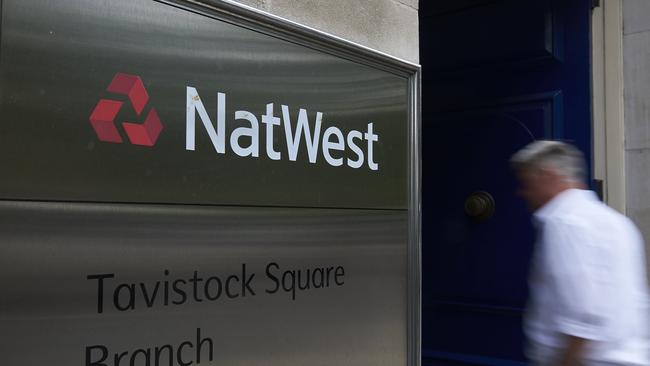
AFP
4.45am: Stock market glitch ‘not a cyber attack’
A problem that halted trading on the Paris stock market and others across Europe was a “middleware” issue and not a cyber attack, operator Euronext said.\
Trading ground to a halt for around three hours early Monday in Amsterdam, Brussels, Dublin, Lisbon and Paris, and the French market closed late, before issuing a statement that most trades made after 5:30 local time (1530 GMT) would be annulled.
“It was not a cyber attack,” a Euronext spokesman insisted.
“It was a technical problem that has been resolved at the middleware level, one of the systems that ensures the persistence of data,” he told AFP.
AFP
4.40am: Sweden bans China’s Huawei from 5G network
Sweden has banned Chinese telecoms groups Huawei and ZTE from its 5G network for security reasons, the Swedish telecoms regulator said.
The ban is in line with new legislation that entered into force in January 2020, following an examination by the Swedish armed forces and security service “to ensure that the use of radio equipment in these bands does not cause harm to Sweden’s security,” the Swedish Post and Telecom Authority said in a statement.
Huawei, the world number two in mobile phones and a market leader for next generation 5G equipment, and ZTE will also have to remove any existing installations by January 1, 2025.
Australia has also banned Huawei from its 5G rollout on security grounds.
The United States alleges Chinese firms are used to spy for Beijing -- allegations which China denies -- and has piled pressure on allies to cut Huawei from their internet infrastructure.
Britain in July banned mobile providers from using equipment made by Huawei in their new 5G networks, and gave companies in the UK until 2027 to remove Huawei equipment.
France has also placed heavy restrictions on the use of equipment by Huawei.

AFP



To join the conversation, please log in. Don't have an account? Register
Join the conversation, you are commenting as Logout